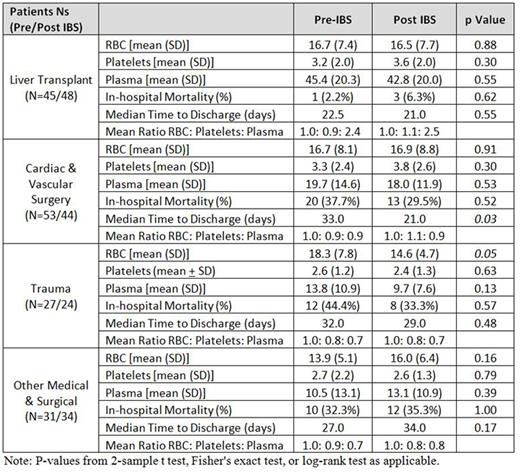Abstract

The amotosalen/UVA process (INTERCEPT Blood System Cerus corp., CA) (IBS), is designed for the ex vivo preparation of pathogen-inactivated whole blood-derived and apheresis platelets. The system is intended to reduce the risk of transfusion-associated transmission of viruses, bacteria, and parasites, prevent transfusion-associated graft versus host disease, and may also reduce the risk of other adverse effects due to transfusion of contaminating donor leukocytes. Amotosalen/UVA treatment may be used in place of testing and/or leukoreduction for prevention of transfusion-transmitted CMV infection, and also as a replacement for bacterial culture screening. Amotosalen/UVA-treated PC have proven effective at treating and preventing bleeding in clinical trials and in routine use, however most prospective randomized studies were performed in hematology/oncology patients. We investigated efficacy during massive transfusion (MT) for active bleeding in general hospitalized patients.
Amotosalen/UVA treatment was introduced at a large Austrian academic medical center for all apheresis and whole blood platelets suspended in a platelet additive solution, in January-March 2013. We investigated component use on the day(s) of the MT event, in-hospital mortality and length of stay after the event in all patients who received ≥ 1 PC and ≥ 10 red cell (RBC) components on a single day, for 21 months prior to and after universal IBS implementation.
306 patients had MT on 331 days, with 11 patients receiving MT on 2 consecutive days which were analyzed as a single MT event, and 12 patients had MT events on 2 or 3 non-consecutive days. Patients were mostly male (74%) over 18 years old (304/306). 93 patients underwent liver transplant; 97 had cardiac or vascular surgery procedures, including cardiac transplant (11) and emergent aortic aneurysm repair, while 51 were treated for trauma. The remaining 65 were treated for a variety of medical and surgical indications.
Based on analysis of the first MT episode, component use on the day(s) of the MT event was unchanged pre and post IBS implementation, except trauma patients used fewer RBC post IBS. The mean ratio of RBC: platelets: plasma (assuming 1 dose of platelets = 6 whole blood platelets) was close to 1:1:1, except for liver transplants who used a disproportionate amount of plasma components in both periods. In-hospital mortality and median time to discharge did not change after implementation of IBS PC, except for cardiac and vascular surgery patients who were discharged earlier in the post IBS period.
The introduction of amotosalen/UVA-treated, pathogen inactivated PC did not adversely affect outcomes in massively transfused patients in terms of blood product usage, in-hospital mortality and length of stay in a range of clinical indications for platelet transfusion support.
Chen:Cerus corp.: Employment. Lin:Cerus corp: Employment. Benjamin:Cerus corp.: Employment.
Author notes
Asterisk with author names denotes non-ASH members.

This icon denotes a clinically relevant abstract


This feature is available to Subscribers Only
Sign In or Create an Account Close Modal